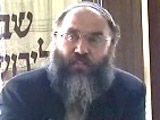- Sections
- Bemare Habazak - Rabbis Questions
351
Answer: At this point, we expect that much of the physical celebration will have to be toned down due to the Torah’s mandate to protect ourselves/each other. But your question has a practical dimension and gives pause to consider what we celebrate on ST.
Your question is based on the possibility that some ST practices are due to our "making a siyum" on the Torah reading. Indeed siyumim do justify joyful actions that are otherwise forbidden, (e.g., eating on Ta’anit Bechorot, eating meat during the Nine Days).
Do any ST practices need special justification? V’zot Haberacha is the Torah portion for the last day of Sukkot (Megilla 31a) and is not only the next parasha up but also connects Moshe’s beracha to Shlomo’s beracha at the end of Sukkot (Avudraham, Shemini Atzeret). But reading Bereishit and the multiple aliyot need a link to the special event. The same is true for those who lain at night and the minhag to take out all of the sifrei Torah when we are not going to read from all of them (see Rama, Orach Chayim 669:1). Dancing on Yom Tov is also permitted only because of the celebration (Teshuvot Hageonim 314).
If only individuals, but not a whole shul, miss a parasha there would be no question for the individuals to act like everyone else. Otherwise, we would need new rules for many people, who miss due to illness, travel, etc. most years. Indeed, kri’at haTorah is a public mitzva (Ramban on the Rif, Megilla 3a) and thus relates to the community. Your question is pertinent when a majority of the shul missed parshiyot (see Mishna Berura 135:7).
The matter of finishing up also has an individual element, which you can fulfill. The halacha of shnayim mikra v’echad Targum requires you to read the parasha twice and learn it with Unkelus and/or Rashi every week (Shulchan Aruch, OC 285:1). While it is best to complete this practice each Shabbat, one can make it up until ST (ibid. 4). In that way, those who miss have a level of siyum, parallel to the communal one.
A possibly related machloket to our question is what a shul does when reopening after missing parshiyot. The Rama (OC 135:2, based on the Ohr Zarua) says that they must make up a missed parasha. The Meiri expounds that we do not say "what was, was," in order that at the year’s end they will have finished everything. On the other hand, many (including the Magen Avraham 135:4) rule like the Maharam Mintz that one makes up only one parasha at most; if more was missed, we would not be bothered that parshiyot were missed. Others require to make up as many as needed (Mishna Berura 135:6 cites both opinions). One can claim they disagree whether it is important to have read every parasha by year’s end. We can (but need not – beyond our scope) reason as follows: If your shul held by the strict opinion, they made up the missed parshiyot. If they did not find that necessary, apparently they hold that the "hole" in the Torah reading is not significant.
Clearly, the minhagim of ST, which have developed over centuries (see Hamoadim Bahalacha p. 135-141) are connected to that which WE finish the Torah. However, in the absence of sources to the contrary (which I have not found), we must presume that the fact that it is time for Klal Yisrael to finish the Torah makes it a time to celebrate. Various practices and sources indicate that the focus is on honoring the Torah (see Netzer Mata’ai 6; Pnei Aharon, OC 10) and thanking Hashem for our opportunity to learn it, not celebrating our diligence in finishing our reading. Therefore, even when communities miss multiple parshiyot, whether European Jews during World War II, Jews behind the Iron Curtain or, l’havdil, us this year, ST is still a time for heart-felt joy and special practices, in honor of the Torah and our strong connection to it.

White and Nice Clothes and Gold on Yom Kippur
Rabbi Daniel Mann | Tishrei 4 5780

Washing Hands with Soap on Yom Kippur
Rabbi Daniel Mann | Tishrei 4 5776

Ask the Rabbi: Purim Meshulash
Rabbi Daniel Mann | Adar 5785

Answering Devarim Shebekedusha During One’s Beracha
Rabbi Daniel Mann | Cheshvan 10 5778

The War of the Kings and its Significance
Parashat Lech Lecha
Rabbi David Dov Levanon | 5762

Selah
Rabbi Avraham (Abe) Abrahami | Cheshvan 5779
Korbanot – The Passages of the Sacrificial Offerings
Chapter thirteen-part one
Rabbi Eliezer Melamed | 5775










